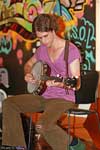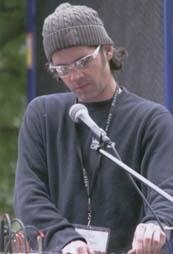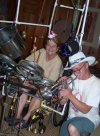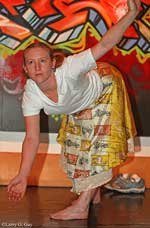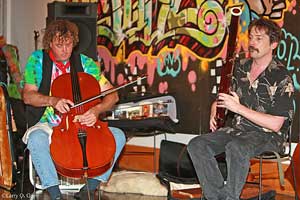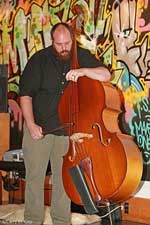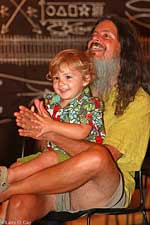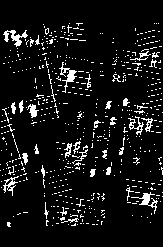
Home
Articles
Reviews
Hot Links
About Us
Improvisation
|
||
| I propose, that
in our society, the musician
could once again rise as proponent and leader of
primal ritual celebration,
using music, as a tool of cultural recreation.
Accepting the premise that Recreational music improvisation is facilitated by musical leadership, whether it is by shaman, jazz musician, contemporary music educator, neighborhood band leader, or common social initiation. The role of music in our lives must become more immediate. It must become more a part of our own bio-rhythms, and daily rituals. Just like going to the gym, or having lunch or sleep, or a moment's meditation. What a gift of time it would give us, to sing every day. To transform time into singing. To play everyday, like children. Maintaining the playfulness, the curious, the imaginative, the qualities that are so rich and natural to us in our childhood. Must we grow up only to work, and never to play? A sad condition for the human spirit, indeed. The role of music education, then, must shift, to accommodate the education of all people, not just to train music specialists. As well, it must even move beyond the oral tradition of learning songs, the native songs of each culture, which have traditionally, "in the old days" been passed down as folk songs, but unfortunately, today, are actually being lost. Musical education must evolve beyond traditional technical training on musical instruments, and the historic approach to styles and contemporary composition practices which alienate and exclude a large portion of our society. Music practice could, on the other hand, be inclusive of every child and person, and encourage participation on wide spread scale as a recreational form, just as certain sports have become the "national past-time." What is needed is a massive re-education of the population, bringing a heightened awareness of making music as personal leisure, and that in our society, this too, is personal medicine. We must, as practitioners and educators, bring a new focus to the frontlines of our own practice. As leaders in our field, we must encourage those with no musical experience outside turning a radio knob or pressing a cd player to participate together, to feel what it feels like when one "plays". To break the barriers of education, and instead, create exchange between those persons, and the privileged ones with formal musical backgrounds and professional experience. We must encourage the novice to experiment. We must give them permission, and equip them with a philosophy that brings comfort AND curiosity. Beginning with the given factor that first, there is silence, second there is noise, and third, from those two points, will rise a musical order. And, that "order" will be determined, by the musical genes of the individual. What I am calling the "musical genes" is the pre-disposition of music which is inherent in every human being as a result of their cultural background, their education and experience, (or lack of it), and their exposure. Their physical abilities to move, and their acquired skills of listening and responding are no different in this case, than in the case of learning to "catch a ball" or learning to ski. Basically, if we encourage group music, with a wide-angle philosophy of what that is, we open new doors for a "cultural recreation". Because of the mass media and musical marketing practices in our society, this could be a difficult undertaking. People are barraged and dulled by aggressiveness of the popular music market. Particularly, the practices of commercial radio and television networks, which seize profits from pushing the market directions through advertising short-term hits and trends, so that many people see music as a hat-rack, upon which to hang their emotional complaints… as in songs which lament lost lovers, or elevate sexual frustration. (ie. "I want you" etc.) Of course, then on the other hand, there is the Christian music market, which also uses music to hang the hats of their texts of belief and hope. And there are the Public Radio Stations, which in my area of the U.S. (down South in Alabama), still insists that classical music is it for high art music. A little jazz is done for 4 hours on weekends to satisfy the popular culture, and powdermilk biscuits are part of the course of comedy and "mom and pop" mentality, seeping in as a "old timey" folk music… But what of the music which is being currently created in our time? Even on NPR, to hear this is a rare event! And still, this is all available from loudspeakers, airwaves, electronic medium, without the need of a real musical instrument in the room. I like to compare it to a frozen dinner! Ah, the corporate kitchen has supplied us with a ready made frozen dinner to eat. But where did it come from? Still, there is a need for human beings to return to the practice of music as a personal expression-- of emotion, thought, and condition of the soul. This can be done through the genesis of a creative music-making, based on sounding energies; not just using the conventional backdrops of pop-music as a vehicle for verbalized conditions, such as song. The act of engaging in free improvisation will become a liberator, an emancipator, for many people to touch into their emotional lives in a non-verbal and a non-judgmental way. We must introduce this healthy way of life. From a basic understanding that noise is the music of the Universe, that noise is good, that noise is normal, that silence is the other side of noise, the direct inverse of noise. That which is full becomes empty. Consider it as though we have a full vase of water (noise). We pour some water from the vase, taking some of the elements out of the noise. We hold these elements. Separated from the noise, they are art. We drink from it and are nourished. On the other hand, we visit the empty vase, the Silence. We sit with it. We listen. We hear. From Silence rise out the inner voices, which talk to us. We listen. We pour water back into the vase. It is art, it is music, and it is the expression of our own lives. Our lives become full again. Who is not "too busy"? We live constantly between the Noise and the Silence. It is what we do with our lives in between which brings the order, or the "music" that we make. I have been speaking in a metaphorical language, using the term "music" to mean, "our lives". But are not our lives a form of music? With this awareness, shall we not enjoy life? Shall we not pick up our tools and till our gardens? Shall we not from either Noise or Silence, make music? Back to cultural recreation. Let us use this opportunity to re-evaluate the condition of music in our society. Let us not look only to our Shamans, the composers, the jazz musicians, the pop-stars, or even the media, and the market, for our music. Let us look within ourselves. As an educator, I would take the responsibility to lead and encourage every human being to make their own music. And one of best ways I can think of, is the practice of musical improvisation. Anybody can do it. Everyone can participate. For some, indeed, for many, it may take some introduction. But if we can continue the dialog with our children, our peers, and the ordinary people in our audiences, we can make a "collective music," which will bring about more healing in the world than a century of psychoanalysts and shrinks. What people need is the non-verbal connections to their inner selves. They need access to their places of Silence and their Noise, and the tools to make music from these two extreme conditions. Musicians all share this magic. We must make this gift available to everyone. O.K., it's very simple. Every human being should have a musical instrument. Of course, we all have a musical instrument, as we were born with our voices and our bodies. We use our voices. We use our bodies, everyday. We use them to communicate. We use them to talk, to cry, to scream, to laugh, to express our emotions. We Sing. We use our voices to carry the melodies of our poetry. But we also have at our fingertips, tools. A musical instrument is a tool to carry us even further in our discovery process to the realm of non-verbal musical exchanges. If you will, indulge me in another simple metaphor. We can plow our fields with our hands. But we have learned to use hoes, picks, and shovels. Earth-movers, such as tillers, ditch-witches, steam shovels, and caterpillars. And, we've even moved mountains by detonating dynamite! We learned to count on our fingers. But we also learned to employ the abacus, the adding machine, then modern calculators, and now computers to facilitate our mathematical computations and projections. Why then, does not everyone play also a musical instrument? I suppose it is because we have not emphasized enough in our society, music as a recreational form. We can make sounds together, born from either noise or silence. We can create a form of cultural recreation, which will bring pleasure, joy, and fulfillment. It is within the range of everyone, or anyone, to participate. Our concepts of musical instruments also must be challenged. Of course, we have the classical instruments of our cultures. We now have the high-tech, the experimental, and the yet undiscovered. Perhaps the first inquiry should be, "How can I make a sound"? What will I use? And furthermore, make expression from the sound. Collective engagement with others making sounds from our choice of instruments, whether it is a violin, a saxophone, a blade of grass, or a metal pot or pan, creates then a collective sound. It is much like having a palette of colors from which to paint. A bucket of noise from which we can draw out the waters of our imaginations… To shape and mold our "found sounds" into cups of substance, something we not only recognize as our own, but that we enjoy, and which belongs to us. The pleasure of it all is the point. Look around you. See the myriad of possibilities. What would you choose to play if you could imagine yourself singing through a musical tool? It is as personal as a favorite color, a food preference, or a favorite breed of dog. It's as available as your favorite color or food preference. It is really just an awareness. So, let's take up our musical instruments, and proceed into the noise and the silence with fearless, but playful abandon to discover what is within. And in the process of this journey, we will be given insights, guide-posts, and new territories to discover. What could be more fun? What kind of recreation is this? This, indeed, would be a cultural "re-creation"of our Society. . . Some Suggestions for Playing 1. Create a piece from silence. Start sparcely by humming. Be sure to hear the silence before making a sound. Stay with it a while. Find an ending. 2. Create a piece from Noise. Just go at it. Don't worry about a thing…Watch as you hear it organizing itself. 3. Create a piece using "voiceless" mout and body techniques. Remember that some sound is visual. Build on the natural flow of rhythms and/or space. Just notice where it goes. 4. INWARD/OUTWARD One group starts with long blending tones or horizontal attitude Other individuals make exceptions, with specific, possibly short interruptive sounds. See what happens. 5. If there are instruments, check them out "See what they will do" or see what they do for you. The only requirement is to have respect for the process. These are just some simple rules: as in a game to play. Improvisatory compositions are created by awareness and willingness to play. Game rules help create structures, awareness recognizes these structures. The things to develop recognition for are shapes, colors, beginnings, middles or developments, endings, ambience, and resonance. The personal process can be going inward, or outwardly playing; but either way relating to the external dimensions. The attitude is to to enjoy! |

